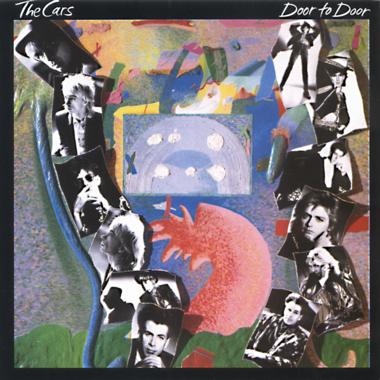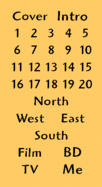(*)
Quotes taken from review (by Mike DeGagne) on All
Music Guide.
© Marco Glaviano and Emanuele DiLiberto for the album cover.
© Ric Ocasek/ Elektra/Asylum for the music (excerpt).
© Per A.J. Andersson for the text. Written July 2003, updated November 2011.

Door
to Door
by the Cars
| It was "Heartbeat City" with its host of up-tempo beat singles and cleverly conceived music videos that propelled the Cars to near-superstar status. But it was their swan-song, the dark and ill-fated "Door to Door", that carried the more musical depth. — • — The Cars were undoubtedly the most successful American new wave band to emerge in the late '70s. Talking Heads may have won the hearts of the critics, but they didn't rack up a string of platinum albums and hit singles, featuring a sleek, mechanical pop-rock. As the Cars, who despite the more commercial orientation carried with them their roots within proto-punk, garage rock and bubblegum pop. This New York band had enough attitude to crossover to album rock radio, where they soon made a name for themselves. With inspiration from David Bowie and Roxy Music, and an insistent, rhytmic pulse, the Cars became the band to keep up with. The group had a flair for visuals, and the advent of MTV meant yet another arena was awaiting. From their 1984 album "Heartbeat City" five successful singles were selected. Together with an equal number of striking and highly innovative music videos, sending the Cars to near-superstar status. — • — Instead of following up this success, the members of the band took time off to produce solo efforts. They returned only in 1987 with a record that was to become their farewell album. Both the critics and the public had in the meantime gone elsewhere, and the darker and more brooding character on much of "Door to Door" fell on barren ground. This album fell more in line with the solo career of leading "car driver" Ric Ocasek. His musical meanderings were often more introvert and thoughtful. "Door to Door" was wholly an Ocasek production, and it contrasted markedly to the more sunny feel given to "Heartbeat City" by producer Robert John "Mutt" Lange of Dep Leppard fame. Critics found it "lackluster", noting its "murky instrumentation" and "cloudy melodies" and missing the "savvy pop jump" (*) that had been a trademark of the Cars. There are some more easy-going things ("Everything You Say" and "Coming up You"). But the more dreamy, autumn ambiances result in some of the Cars' very finest - witness "Fine Line" with its carefully synthesised wrapping and the similar "Wound Up on You". "Strap Me In" engages with both dynamite and introspection. Then, quite unlikely, the record ends with the aggressive title tune, rounding up a decidedly uneven but quite misunderstood record. — • — Dark colours were no novelty for the Cars, however. Already on their debut album the somber sentiments are visible, not the least the two last songs - written by Ric Ocasek and Ocasek/Hawkes respectively. The group then quickly went into more danceable territory, but the sign was already there. Ric Ocasek has been the most productive ex-member of the Cars. He has often ventured into more experimental music, still retaining the mix of darkness and hooks that made the Cars such a memorable new wave act. His musical endeavours didn't always get the go-ahead. Such was the fate of "Quick Change World", a project comprising of a double CD plus a book of poetry condensed down to a single CD by an inappreciative record company. // |
|
DOOR
TO DOOR |
ALBUMS
by Ric Ocasek |

